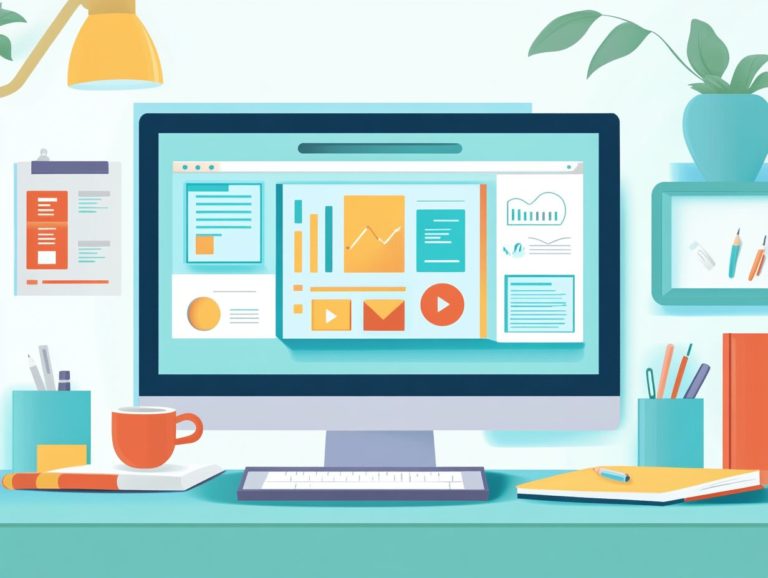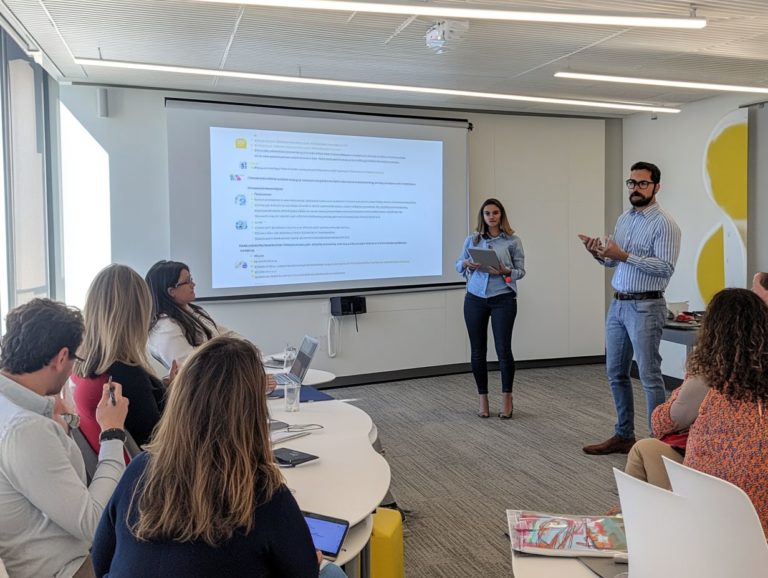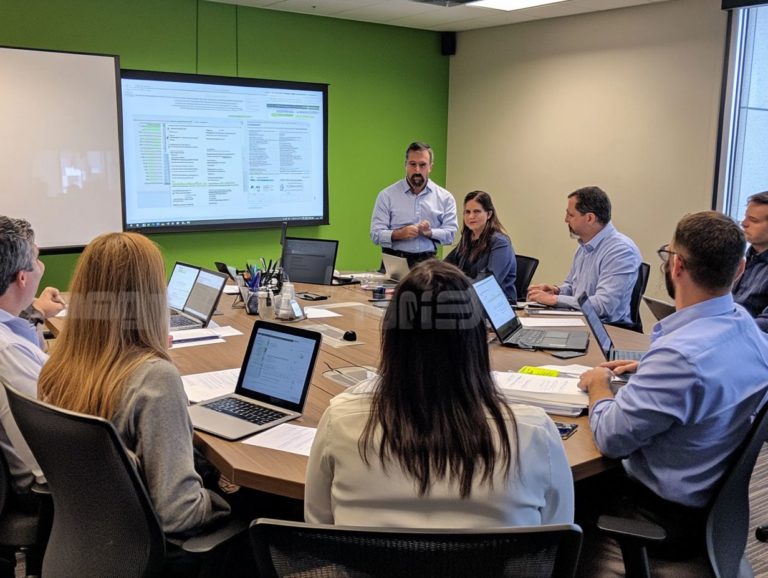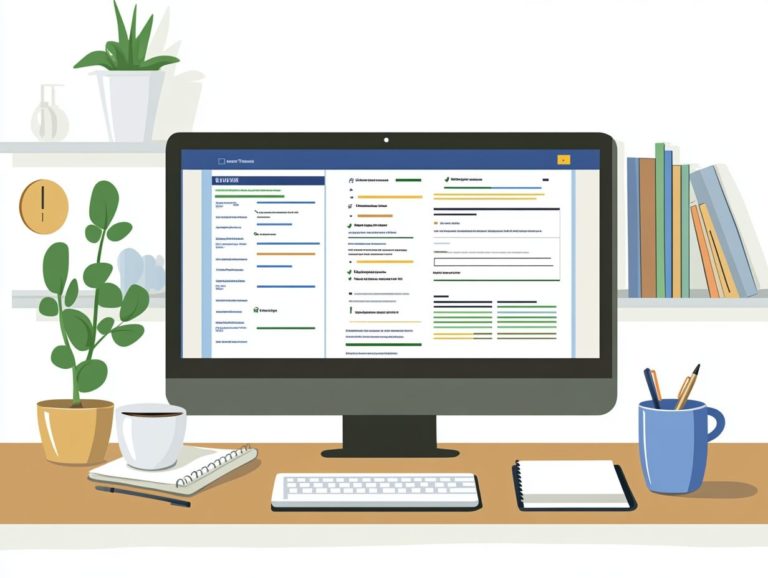“Developing a CRM User Support Strategy”
In today s fast-paced business landscape, mastering Customer Relationship Management (CRM) is essential for building strong relationships with customers and driving growth.
Successful CRM implementation hinges on robust user support strategies tailored to meet user needs and address potential challenges.
This article delves into the significance of CRM in business, guiding you on how to create and implement an effective user support strategy while tackling common obstacles that may arise.
You ll gain valuable insights on training, measuring satisfaction, and adapting to future changes, all aimed at enhancing your CRM user experience.
Contents
- Key Takeaways:
- Understanding CRM User Support
- Creating a User Support Strategy
- Implementing the Strategy
- Common Challenges and Solutions
- Future Considerations for User Support
- Frequently Asked Questions
- 1. What is a CRM user support strategy?
- 2. Why is it important to have a well-developed CRM user support strategy?
- 3. How do you develop a CRM user support strategy?
- 4. What are some key elements of an effective CRM user support strategy?
- 5. How can a CRM user support strategy benefit an organization?
- 6. Can a CRM user support strategy be tailored to different types of users?
Key Takeaways:

- Understand how CRM impacts user support.
- Develop a user support strategy that addresses customer needs.
- Implement training and improve support continuously.
Understanding CRM User Support
Understanding CRM user support is crucial for any business that wants to succeed in elevating its customer relationship management strategies. Effective CRM enhances customer interactions and significantly contributes to driving sales growth and cultivating customer loyalty.
In today s landscape, where personalized communication is paramount, implementing a well-structured user support strategy becomes essential for achieving business objectives and ensuring operational efficiency.
By harnessing CRM tools, which help manage customer information and interactions, you can deliver outstanding customer service and build deeper connections with your clients. This ultimately results in heightened customer satisfaction and improved retention rates.
Defining CRM and Its Importance in Business
Customer Relationship Management (CRM) is your go-to strategy for managing customer data, interactions, and engagements in a way that significantly enhances overall business performance.
Think of CRM as a vital framework that enables you to streamline communication and build relationships with your clientele. Key components of CRM include effective customer data management and engaging pathways.
By securely storing customer information and extracting insights from past interactions, you can tailor your services and marketing efforts to align with each customer s unique preferences. This data-driven approach elevates the customer experience and propels sales growth through personalized engagement.
With a successful CRM strategy in place, you cultivate customer loyalty, establishing a cycle of trust that leads to sustained profitability and enthusiastic brand advocacy.
Creating a User Support Strategy
Developing a robust user support strategy is essential for ensuring that customers receive continuous assistance and satisfaction.
This commitment enhances their overall experience with the CRM platform and fortifies customer loyalty in the long run.
Identifying User Needs and Pain Points
Identifying user needs and pain points is crucial for crafting a successful CRM strategy. Understanding customer behaviors helps tailor services effectively. Utilize surveys and feedback to gain insights into what your customers truly value.
When combined with robust data analysis techniques, you can uncover underlying issues that might not be immediately apparent.
For example, analyzing customer journey maps can reveal specific drop-off points, giving you clarity on where users encounter frustration. By strategically addressing these challenges, you can enhance the overall user experience and foster a sense of loyalty, knowing that satisfied customers are more likely to return and advocate for your brand.
Establishing Support Channels and Resources

Establishing effective support channels and resources is crucial for providing exceptional customer service. This ensures you can easily access the help you need while using CRM tools.
By incorporating live chat, email, and phone support, organizations can accommodate your diverse preferences. This allows you to choose the method that best suits your style.
Live chat provides real-time assistance, facilitating immediate problem resolution. In contrast, email offers a clear and documented approach for more complex inquiries. Phone support adds a personal touch, fostering stronger relationships and building trust.
Equipping employees with comprehensive training materials significantly enriches their skill set, enabling them to assist you more effectively.
A well-structured support system not only increases your engagement but also significantly enhances retention rates by making you feel valued and empowered.
Implementing the Strategy
Implementing your user support strategy requires a well-structured approach to employee training and onboarding. This process is designed to equip your staff with essential skills needed to boost customer retention.
Utilize a reporting dashboard to track progress effectively and measure success along the way.
Training and Onboarding Processes
Effective training and onboarding processes are essential for you to become proficient in using CRM software. This ultimately enhances operational efficiency and elevates customer satisfaction.
By providing comprehensive training sessions, you can significantly boost your confidence in navigating the software. For example, a well-known retail company rolled out a structured onboarding program featuring hands-on workshops and peer mentoring. This initiative led to a remarkable 30% reduction in the adaptation period for their staff.
Never underestimate the power of ongoing education! Regular refreshers and advanced training that align with your business’s evolving needs enable you to maximize the CRM’s potential.
Companies that prioritize feedback loops and continuous learning opportunities often experience improved employee engagement and reduced turnover, underscoring the value of a flexible and responsive training approach.
Measuring and Improving User Satisfaction
Measuring and improving user satisfaction is essential for your CRM strategy. By establishing important performance measures and collecting customer feedback, you can make data-driven decisions that genuinely enhance overall satisfaction levels.
Utilizing methodologies like surveys and feedback mechanisms can offer invaluable insights into the customer experience. This helps illuminate areas that need improvement.
Taking action based on the information you gather is crucial. It shows your commitment to elevating customer service and fosters deeper engagement with your audience.
Act now to refine your processes continually! By doing so, you can build lasting relationships with your clientele, ensuring you’re always responsive to their evolving needs and preferences.
Common Challenges and Solutions
Common challenges you may encounter with CRM user support can range significantly, from technical glitches to user resistance. However, pinpointing effective solutions is essential for ensuring seamless customer interactions and enhancing overall satisfaction.
Start transforming your CRM user support today!
Addressing Technical Issues

Addressing technical issues promptly is crucial to keep things running smoothly. Fix these issues quickly to avoid frustrated users and missed opportunities!
When not managed effectively, disruptions can lead to frustrated users and lost opportunities. It s essential to identify and resolve common challenges, such as data synchronization errors, system downtime, or integration failures in Customer Relationship Management (CRM) systems.
Establishing robust support channels, whether through in-house teams or outsourced services, will enable quicker resolutions.
By implementing best practices for troubleshooting like thorough documentation and regular system audits you can ensure smoother operations. This proactive approach enhances system reliability and fosters trust and loyalty among your customers.
Dealing with User Resistance
Dealing with user resistance to new CRM strategies is a challenge you re likely to encounter. However, addressing underlying concerns and providing ongoing support and training can pave the way for acceptance.
To manage this resistance, consider implementing a well-structured communication plan that clearly outlines the benefits of the new system. This ensures that all stakeholders grasp the value it brings to the table.
Change management techniques, such as involving users early in the change process, can significantly reduce fears and create a more collaborative atmosphere.
By offering comprehensive training programs, you equip employees with the skills they need to navigate these changes with confidence. This approach smooths the transition and enhances overall engagement, ultimately leading to a more successful implementation.
Future Considerations for User Support
Future considerations for user support in CRM systems should center on your ability to adapt to changing technology and the evolving needs of users.
It’s essential to ensure that customer preferences are acknowledged and met with precision in a dynamic market landscape.
Embracing these shifts will enable you to provide exceptional support and maintain a competitive edge.
Adapting to Changing Technology and User Needs
Adapting to the ever-evolving landscape of technology and user needs is essential for you to maintain effective CRM user support. This adaptability allows your business to stay ahead of market trends and elevate customer engagement.
With rapid advancements in artificial intelligence, machine learning, and data analytics, you now have unprecedented opportunities to refine your customer relationship management strategies. By harnessing these emerging technologies, you can gain deeper insights into user behavior, enabling you to tailor your services with precision.
Stay updated on these technological shifts not just to meet current demands, but to anticipate future expectations. This proactive stance helps you connect better with your customers, ensuring long-term loyalty and satisfaction amid a competitive landscape.
Incorporating Feedback and Continuous Improvement
Incorporating feedback is essential for your continuous improvement in CRM user support. By leveraging customer insights, you can make data-driven decisions that truly enhance user satisfaction.
Actively seeking out input through surveys, interviews, and direct interactions allows you to gain a deeper understanding of user needs and preferences. This is especially crucial in today s fast-paced market, where expectations are in constant flux.
Utilizing tools like real-time feedback loops enables you to promptly adjust your support strategies, ensuring that you effectively meet user demands. For example, a well-known software provider integrated regular user suggestions into their CRM updates, leading to a significant boost in user retention rates.
Such examples highlight the importance of an adaptive mindset, demonstrating how user feedback can lead to improved services and foster lasting loyalty.
Start implementing user feedback today to boost satisfaction!
Frequently Asked Questions

1. What is a CRM user support strategy?
A CRM user support strategy is a plan that organizations use to assist users of their CRM systems. CRM helps businesses manage their interactions with customers.
It involves developing and implementing processes, tools, and resources to help users effectively utilize the CRM system and solve any issues they encounter.
2. Why is it important to have a well-developed CRM user support strategy?
A well-developed CRM user support strategy is crucial for the successful adoption and use of a CRM system. It ensures users have the support they need to use the system effectively.
This ultimately leads to improved customer relationships, increased productivity, and better business outcomes.
3. How do you develop a CRM user support strategy?
The first step in developing a CRM user support strategy is understanding the needs and challenges of your CRM users. This can be done through surveys, interviews, or focus groups.
Next, identify the key areas where users may need support and develop processes and resources to address those needs. Regularly reviewing and updating the strategy is crucial for maintaining its effectiveness.
4. What are some key elements of an effective CRM user support strategy?
An effective CRM user support strategy should include clear documentation, training materials, a dedicated support team, and user-friendly tools.
It should also have a system for tracking and addressing user issues and feedback, along with regular communication and updates to users.
5. How can a CRM user support strategy benefit an organization?
A strong CRM user support strategy can transform your organization! It can improve user adoption and satisfaction, leading to better use of the CRM system and increased productivity.
Additionally, it can help identify areas for improvement in the system and provide valuable insights into user needs and preferences.
6. Can a CRM user support strategy be tailored to different types of users?
Yes, a CRM user support strategy can and should be tailored to different types of users. For example, sales representatives may need more training on lead management, while customer service representatives may require guidance on issue resolution.
Understanding each user group’s unique needs is crucial for your success!






